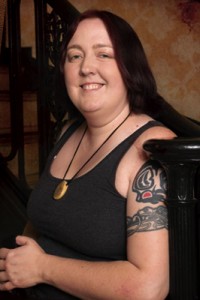Andy Duncan: The Story Engine
 Andy Duncan was born in Columbia SC. His first published fiction was novelette ‘‘Liza and the Crazy Water Man’’ in the first Starlight anthology (1996). His first sale was actually ‘‘Beluthahatchie,’’ which appeared in 1997 in Asimov’s, and went on to become a Hugo Award finalist. On the strength of those pieces, he was a finalist for the John W. Campbell Award for Best New Writer in 1998. Novellas ‘‘The Executioners’ Guild’’ and ‘‘Fortitude’’ (both 1999) were Nebula finalists; ‘‘Lincoln in Frogmore’’ (2000) was a World Fantasy nominee; ‘‘The Pottawatomie Giant’’ (2000) won the World Fantasy Award and was a Nebula finalist; ‘‘The Chief Designer’’ (2001) won a Sturgeon Memorial Award, and was a Hugo and Nebula Award finalist; ‘‘Zora and the Zombie’’ (2004) was a Stoker and Nebula Award nominee; ‘‘Unique Chicken Goes in Reverse’’ (2007) was a finalist for the Shirley Jackson and Nebula Awards; and novella The Night Cache (2009) was a World Fantasy and Shirley Jackson Award nominee. His first collection, Beluthahatchie and Other Stories, appeared in 2000, and won the World Fantasy Award. New collection The Pottawatomie Giant and Other Stories is upcoming from PS Publishing in early 2012.Duncan taught undergraduate English for eight years, first at NC State University and then the University of Alabama. He was senior editor at trucking magazine Overdrive for five years, leaving in 2008 for a tenure-track job in the English department at Frostburg State University in Frostburg MD, where he lives with his wife Sydney.
Andy Duncan was born in Columbia SC. His first published fiction was novelette ‘‘Liza and the Crazy Water Man’’ in the first Starlight anthology (1996). His first sale was actually ‘‘Beluthahatchie,’’ which appeared in 1997 in Asimov’s, and went on to become a Hugo Award finalist. On the strength of those pieces, he was a finalist for the John W. Campbell Award for Best New Writer in 1998. Novellas ‘‘The Executioners’ Guild’’ and ‘‘Fortitude’’ (both 1999) were Nebula finalists; ‘‘Lincoln in Frogmore’’ (2000) was a World Fantasy nominee; ‘‘The Pottawatomie Giant’’ (2000) won the World Fantasy Award and was a Nebula finalist; ‘‘The Chief Designer’’ (2001) won a Sturgeon Memorial Award, and was a Hugo and Nebula Award finalist; ‘‘Zora and the Zombie’’ (2004) was a Stoker and Nebula Award nominee; ‘‘Unique Chicken Goes in Reverse’’ (2007) was a finalist for the Shirley Jackson and Nebula Awards; and novella The Night Cache (2009) was a World Fantasy and Shirley Jackson Award nominee. His first collection, Beluthahatchie and Other Stories, appeared in 2000, and won the World Fantasy Award. New collection The Pottawatomie Giant and Other Stories is upcoming from PS Publishing in early 2012.Duncan taught undergraduate English for eight years, first at NC State University and then the University of Alabama. He was senior editor at trucking magazine Overdrive for five years, leaving in 2008 for a tenure-track job in the English department at Frostburg State University in Frostburg MD, where he lives with his wife Sydney.
Blog: Beluthahatchie
Excerpts from the interview:
“I take longer writing my stories than other people do. I’m very happy when I look back at the track record. The stories never come out completely the way I intend, because it’s not that simple a process, but they are very much mine – all the eccentric things they do are things that I decided to do in the course of writing them, and they’re not written to anybody else’s formula. I have a terrible time with theme anthologies, because I get invited and by the time I finish the story, either the deadline is past or it doesn’t fit the theme anymore.
‘‘Michael Swanwick was one of my Clarion West teachers back in ‘94, and he told us how it took him ten years to write a story. That was a very seductive model! At least it gave me a different way to think about it, rather than, ‘You sit down, you start a story, you finish the story, then you start the next story.’ I took that as permission to work on a lot of things at once, or have a lot of different ideas in the fire.”
…
 ‘‘When I started – in the mid-’90s – and people were first asking me about my writing, my standard reply was, ‘It’s more Twilight Zone than Star Trek.’ At the time, that still had some currency, but now it seems increasingly retro (though I guess the phrase ‘twilight zone’ has passed into the language). None of my ideas particularly fit the Space Opera model – the vast majority fit what I learned from TZ: the ‘weirdness intrudes on everyday reality’ pattern that Serling’s original series hit so hard. When I was a teenager (this is circa 1981), the only genre magazine I was aware of was Rod Serling’s The Twilight Zone, which was actually carried in the convenience store where I bought my comic books. First I saw the logo, then I saw it had a new Harlan Ellison story, so I snapped it up. I never subscribed, but I think I bought all the issues.
‘‘When I started – in the mid-’90s – and people were first asking me about my writing, my standard reply was, ‘It’s more Twilight Zone than Star Trek.’ At the time, that still had some currency, but now it seems increasingly retro (though I guess the phrase ‘twilight zone’ has passed into the language). None of my ideas particularly fit the Space Opera model – the vast majority fit what I learned from TZ: the ‘weirdness intrudes on everyday reality’ pattern that Serling’s original series hit so hard. When I was a teenager (this is circa 1981), the only genre magazine I was aware of was Rod Serling’s The Twilight Zone, which was actually carried in the convenience store where I bought my comic books. First I saw the logo, then I saw it had a new Harlan Ellison story, so I snapped it up. I never subscribed, but I think I bought all the issues.
‘‘I love American literature, regardless of genre. When I was a graduate student, pretty much learning how to write short fiction, I was taking these classes with John Kessel and he was throwing Howard Waldrop, Terry Bisson, Nancy Kress, and Karen Fowler at me. Oh my goodness, I didn’t know this sort of thing was currently being written! At the same time, I was also taking all these workshops where they were hitting me with Flannery O’Connor, Zora Neale Hurston, Alice Munro – all these great 20th-century short story writers. So when I started writing my own stuff, of course it had elements of all those things, and that didn’t seem strange to me.”
…
‘‘Very often, I’ll write the ending well before I’m done with the story. And if I don’t know what the ending is, as sometimes happens, I at least know what emotional register I want the character to be in at the end, where I want the reader’s attention directed. I spend a lot of work on those endings, and it has always frustrated me a little to hear people say something I’ve written ‘doesn’t end.’ They’re just not the sort of trap-door ironic endings I was trying to impose in my earliest efforts, and they’re not, ‘The bad guys are blown up; everybody cheers’ Star Wars endings.”
…
‘‘Every generation retells the old stories, and makes them part of the new story. And I think that’s true in any subculture, including ours: the stories we tell each other late at night in the lobby, or on panels at conventions. But every family has its family stories, every group of siblings, of parents and children. At a certain point, all the conversation at family gatherings becomes people telling the story that typifies how ditzy this relative is, how stingy this other relative is, whatever.
‘‘I don’t see any of that going away, despite e-books and different delivery systems for fiction to people’s cell phones, and the audiobook – a major revolution which is now so accepted. Now, for many of the required texts in my classes, the students have no paper copies. They’re getting e-copies, and they’re never even calling them up on computer screens; they’re calling them up on their cell phones. So they’re all fiddling on their phones during class, and I look over their shoulders and they’re actually reading the text and highlighting things. It’s so interactive and personalized, it’s a reminder that the story is not just something that exists in a stack of books or at a library. For them, ‘It’s mine, I own it, and it becomes part of me, like my phone or my Blackberry.’ They may return to it, they may forward it, or do their own mash-up of it if they’re really interested.”





